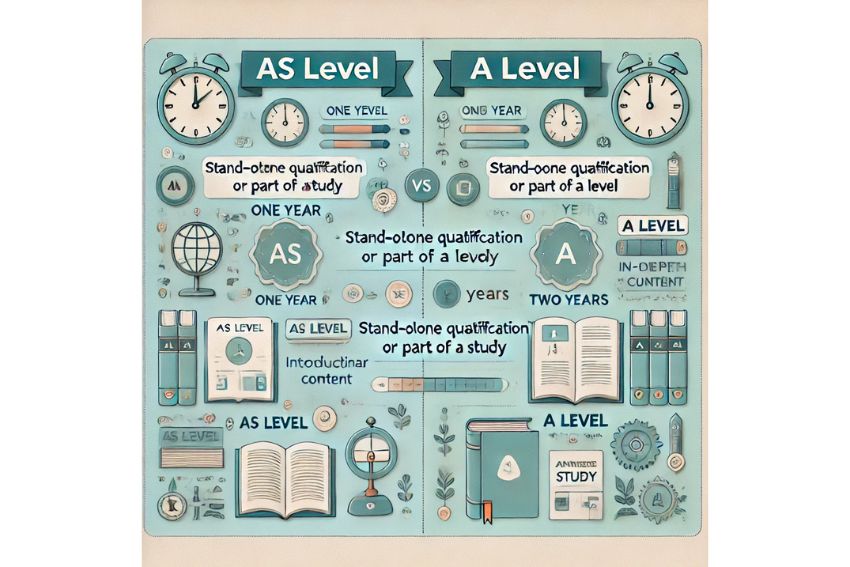Choosing between AS and A-Levels can be daunting, especially when planning your academic future. This guide will help you understand the key differences, the benefits of each option, and how they impact your career or university choices.

1. What are AS and A-Level Qualifications?
AS and A-Level qualifications are a key part of the UK education system, providing students with an opportunity to deepen their knowledge in specific subjects. These qualifications are generally studied by students aged 16 to 18 and form a critical step for those intending to pursue higher education or specialised career paths.
Structure of AS and A-Level Qualifications
- AS Levels: AS Levels (Advanced Subsidiary) are typically taken at the end of the first year of study, known as Year 12 in the UK. They cover the basics of a subject and give students a taste of what further study will involve.
- A-Levels: A-Levels (Advanced Levels) are studied over two years, with students sitting their final exams at the end of Year 13. In some subjects, the AS qualification can contribute towards the full A-Level, but in most cases, they are now considered stand-alone qualifications.
Subject Choices
Students can select from a wide range of subjects, including sciences, humanities, arts, and languages. The most common number of subjects studied is three, although students may choose four if they wish to explore more options. Each subject is graded separately, and universities often require specific A-Level grades for entry into certain courses.
Grading System
A-Levels are graded from A* (the highest) to E, with U representing unclassified. AS Levels are graded from A to E. Achieving high grades in A-Levels is crucial for students aiming to gain admission to competitive universities.
Importance of AS and A-Level Qualifications
- University Entry: A-Levels are often a prerequisite for admission to higher education institutions in the UK and abroad.
- Career Opportunities: Many employers value A-Level qualifications as evidence of a candidate’s dedication, knowledge, and skill.
- Development of Critical Skills: A-Levels require independent study, critical thinking, and problem-solving abilities, which are essential for university and professional life.
Exam Boards and Assessment
Popular exam boards include AQA, OCR, Edexcel, and WJEC. Assessment is typically exam-based, although some subjects also include coursework or practical assessments.
AS and A-Levels serve as a stepping stone for further education and provide students with a foundation for their future careers. They allow students to specialise in subjects they are passionate about, building knowledge and skills that will benefit them in university and beyond.
2. Core Differences Between AS and A-Levels
| Feature | AS Level | A-Level |
|---|---|---|
| Duration | 1 year | 2 years |
| Grading | A to E (no A*) | A* to E |
| UCAS Points | Up to 20 | Up to 56 |
| Exams | At the end of Year 12 | At the end of Year 13 |
| Content Depth | Covers half the A-Level syllabus | Full syllabus |
Since reforms introduced in 2015, AS Levels no longer contribute to the final A-Level grades, making them separate qualifications rather than stepping stones towards A-Levels.
3. Advantages and Disadvantages of AS Levels
AS Levels are qualifications taken during the first year of post-GCSE study (Year 12) in the UK. They offer students a chance to explore subjects in greater depth, without the full two-year commitment required for A-Levels. However, like any qualification, AS Levels come with their own set of benefits and challenges.
Advantages of AS Levels
- Flexibility in Subject Choices
- Students can try out multiple subjects before deciding which ones to continue to full A-Level.
- It provides a broader academic experience, allowing students to explore interests in various fields.
- Reduced Workload Compared to Full A-Levels
- Since AS Levels cover only half of the full A-Level syllabus, they are less demanding.
- This makes them a good option for students who want to manage their workload better.
- Boosts University Applications
- An AS qualification can add value to UCAS applications, showing universities a student’s diverse interests and academic range.
- Some universities may accept AS grades when students are applying for certain courses.
- Opportunity to Reassess Career or Study Goals
- Students may use AS Levels as a way to explore a subject they’re uncertain about, without committing to the full A-Level.
- After Year 12, they can decide whether to drop the subject or continue it to A-Level.
- Early Experience of Formal Examinations
- Taking exams at the end of Year 12 helps students gain experience with high-stakes assessments before their final A-Levels in Year 13.
- This can ease exam stress and improve performance in later years.
Disadvantages of AS Levels
- Limited Recognition for University Entry
- Most universities prefer full A-Level qualifications and may not count AS Levels alone towards entry requirements for competitive courses.
- Additional Exam Pressure
- Students taking AS Levels in Year 12 may face more exams than those who skip AS altogether and only take full A-Levels at the end of Year 13.
- This can add stress and reduce time available for extracurricular activities or personal development.
- Standalone Qualification Structure
- In many subjects, the AS no longer contributes to the final A-Level grade, meaning students must start afresh in Year 13.
- This change in structure can make AS Levels seem less worthwhile.
- Reduced Study Focus
- Juggling multiple AS subjects can make it harder for students to focus deeply on the topics they are most passionate about, compared to those who immediately concentrate on 3-4 A-Level subjects.
- Risk of Subject Abandonment
- Students who drop an AS subject after Year 12 may feel that the time invested in the qualification was wasted, especially if it no longer aligns with their future goals.
AS Levels offer a valuable opportunity for students to experiment with subjects and ease into post-GCSE study. However, their relevance has decreased since reforms made them independent from A-Level grades in many cases. While they can enhance university applications and broaden academic exposure, the workload and limited recognition for competitive courses mean students need to weigh their options carefully. Balancing these advantages and disadvantages is key to deciding whether taking AS Levels is the right choice.

4. How A-Levels Work
In the first year (AS Level), students take exams that provide an insight into their performance and help shape predicted grades. However, the grades from these exams no longer impact the final A-Level result. In the second year (A2 Level), students take exams covering both years of content, which determine the final grades.
5. Impact on University Admissions
A-Level grades are pivotal for university admissions. While AS Levels may add value, particularly in terms of UCAS points, universities primarily assess A-Level grades and predicted grades during the admission process. It’s worth noting that some institutions do not require AS Levels but value them as a sign of academic diversity.
6. Choosing Between AS and A-Levels: Key Considerations
Career Goals
For students aspiring to enter specific fields such as law, medicine, engineering, or dentistry, full A-Levels are often essential. Many competitive careers and degree programmes have strict entry requirements, demanding specific subjects to be taken at A-Level with high grades.
For example, medical schools typically require A-Levels in subjects like Biology and Chemistry, while law programmes may favour students with A-Levels that demonstrate strong analytical and writing skills, such as English or History. In these cases, AS Levels may not be sufficient on their own, as universities in such fields expect evidence of deep knowledge and subject mastery.
University Plans
It is vital to review the entry requirements of your preferred university courses before making a final decision. Different universities and programmes have varying expectations regarding A-Level qualifications. While some institutions may accept a combination of A-Levels and AS Levels for less competitive courses, others especially those offering highly sought-after degrees require a minimum of three full A-Levels.
Checking these requirements in advance will help you plan your academic path more effectively. In some cases, having an additional AS Level may still strengthen your application, demonstrating broader academic interests.
Subject Interest
If you are uncertain about which subjects to pursue for two years, AS Levels offer a valuable opportunity to experiment. Taking an AS Level allows you to explore a subject and determine whether it aligns with your interests and strengths without committing to the full two-year A-Level programme.
For example, if you are curious about Psychology but unsure whether it fits into your long-term academic goals, you could take it as an AS Level. If the subject resonates with you, you can then continue it to A-Level in Year 13. This flexibility allows students to refine their choices after gaining practical experience with the subject matter.
Workload Management
Managing the workload is an important aspect to consider, especially if you plan to take a combination of AS and A-Levels simultaneously. A-Levels are demanding, requiring significant time for independent study, coursework, and exam preparation over two years.
Balancing multiple subjects can be challenging, particularly for students juggling extracurricular activities or part-time work. If you opt for both AS and A-Levels, it is essential to assess whether you can maintain a sustainable workload. While AS Levels involve a lighter syllabus, adding them to your schedule still requires effective time management to avoid burnout.

7. Why Fewer Students Take AS Levels Today
Since the 2015 reforms, the popularity of AS Levels has declined. In 2016, over 270,000 students took AS Levels, but by 2020, that number dropped significantly to 27,100. This decline reflects the shift in focus towards full A-Levels and changing perceptions of the value AS Levels offer. However, they remain a valid option for students who want to explore additional subjects without the full A-Level commitment.
8. Conclusion
Choosing between AS and A-Levels is an important decision that can shape your academic journey and future opportunities. Both qualifications serve valuable purposes, offering unique benefits depending on your goals and interests. AS Levels let you explore different subjects without a long-term commitment. This flexibility suits those still defining their academic path. A-Levels, however, provide in-depth study and are crucial for university admission, especially in competitive fields like law or medicine.
Ultimately, understanding the key differences and considering your career plans, university requirements, and personal strengths will guide you in making the right choice. With the right decision, AS and A-Levels can provide a strong foundation for your academic and professional success.








